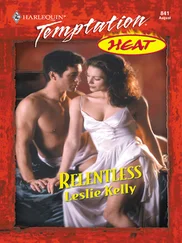“He knew some Spanish. ‘I’m too old to bother with you,’ he said. ‘Tomorrow we’ll take you back to your people. We’ll assure them that you have not been touched by the men. You can go back to your former life.’ Descheeny was pleased with himself; he thought the words sounded suitably generous and sensitive. He watched her face; it was unchanged.
“‘We’ll tell your people where you were found. It was up in a tree, wasn’t it? In the hills, late at night.’ She laughed at him; her nostrils flared and her face was sneering.
“‘You know the answer, old man, don’t play games with me. You know what the people there will do with me.’”
“‘We don’t want that thing around here,’ the three sisters told their husband. ‘It is a disgrace the way you sleep with her every night. We try to teach our children to avoid touching alien things, but every day they see you do it, you senile old man.’ So he moved her to the winter house below the mountains, in the southwest, where the yellow sandrock foothills look over on the river.
“In the middle of the night he heard her moving in the hogan, the soft sounds of basket lids lifted and buckskin bundles unrolling, the rustle of seeds and dry leaves, the clink of eagle claws and wolves’ teeth taken on their strings from his bag. Then there was silence.
“‘I hear you, old man. Go back to sleep.’
“‘I get cold without you close to me. Come lay down again.’
“‘I will if you tell me why I hear so many voices in this hogan at night. All these languages I never heard before.’
“‘Come lay down now. I’m shivering.’
“She lay down beside him and pulled the blanket over her mouth, and gradually moved closer to him until she could feel his thin ribs moving up and down. Old Descheeny’s heart still pounded when he heard her breathing, and the excitement crawled up his thighs to his belly in anticipation.
“‘I think it is them again.’
“‘Yes.’
“‘They are working for the end of this world, aren’t they?’
“‘I think so.’
“‘Sometimes I don’t know if the ceremony will be strong enough to stop them. We have to depend on people not even born yet. A hundred years from now.’ She could only whisper the words because he was holding her close to him now.
“‘You Mexicans have no patience,’ he said, stroking her belly, ‘it never has been easy. It will take a long long time and many more stories like this one before they are laid low.’ She rolled over on top of him quickly.
“‘There is something else which takes a long time happening,’ she said in a low voice. ‘Why do I bother to lay down with you, old man?’
“Old age made him fearless. He flexed the old chants and the beliefs like a mountain-oak bow. He had been watching the sky before she came, the planets and constellations wheeling and shifting the patterns of the old stories. He saw the transition, and he was ready. Some of the old singers could see new shadows across the moon; they could make out new darkness between the stars. They sent Descheeny the patients they couldn’t cure, the victims of this new evil set loose upon the world.
“He reasoned that because it was set loose by witchery of all the world, and brought to them by the whites, the ceremony against it must be the same. When she came, she didn’t fool him for long. She had come for his ceremonies, for the chants and the stories they grew from.
“‘This is the only way,’ she told him. ‘It cannot be done alone. We must have power from everywhere. Even the power we can get from the whites.’
“Although the people detected changes in the ceremonies Descheeny performed, they tolerated them because of his acknowledged power to aid victims tainted by Christianity or liquor. But after the Mexican captive came, they were terrified, and few of them stayed to see the conclusion of his ceremonies. But by then, Descheeny was getting ready to die anyway, and he could not be bothered with isolated cures.
“He gazed into his smoky quartz crystal and she stared into the fire, and they plotted the course of the ceremony by the direction of dark night winds and by the colors of the clay in drought-ridden valleys.
“The day I was born they saw the color of my eyes, and they took me from the village. The Spaniards in the town looked at me, and the Catholic priest said, ‘Let her die.’ They blamed the Root Woman for this birth and they told her to leave the village before dark. She waited until they had gone, and she went to the old trash pile in the arroyo where they left me. She took me north to El Paso, and years later she laughed about how long she had waited for me in that village full of dirty stupid people. Sometimes she was bitter because of what they had done to her in the end, after all the years she had helped them. ‘Sometimes I have to shake my head,’ she’d say, ‘because human beings deserve exactly what they get.’”
The people asked,
“Did you find him?”
“Yes, but we forgot something.
Tobacco.”
But there was no tobacco
so Fly and Hummingbird had to fly
all the way back down
to the fourth world below
to ask our mother where
they could get some tobacco.
“We came back again,”
they told our mother.
“Maybe you need something?”
“Tobacco.”
“Go ask caterpillar.”
“There was a child. The Mexican woman gave her to Descheeny’s daughters to raise. The half sisters taught her to fear her mother. Many years later she had a child. When I was weaned, my grandmother came and took me. My mother and my old aunts did not resist because it all had been settled before Descheeny died.”
Betonie paused and blew smoke rings up at the sky. Tayo stretched out his legs in front of him. He was thinking about the ceremony the medicine man had performed over him, testing it against the old feeling, the sick hollow in his belly formed by the memories of Rocky and Josiah, and all the years of Auntie’s eyes and her teeth set hard on edge. He could feel the ceremony like the rawhide thongs of the medicine pouch, straining to hold back the voices, the dreams, faces in the jungle in the L.A. depot, the smoky silence of solid white walls.
“One night or nine nights won’t do it any more,” the medicine man said; “the ceremony isn’t finished yet.” He was drawing in the dirt with his finger. “Remember these stars,” he said. “I’ve seen them and I’ve seen the spotted cattle; I’ve seen a mountain and I’ve seen a woman.”
The wind came up and caught the sleeves of Tayo’s shirt. He smelled wood smoke and sage in the old man’s clothes. He reached for the billfold in his hip pocket. “I want to pay you for the ceremony you did tonight.”
Old Betonie shook his head. “This has been going on for a long long time now. It’s up to you. Don’t let them stop you. Don’t let them finish off this world.”
The dry skin
was still stuck
to his body.
But the effects
of the witchery
of the evil thing
began to leave
his body.
The effects of the witchery
of the evil thing
in his surroundings
began to turn away.
It had gone a great distance
It had gone below the North.
The truck driver stopped at San Fidel to dump a load of diesel fuel. Tayo went inside the station to buy candy; he had not eaten since he had left Betonie and his helper up in the mountains. The room smelled like rubber from the loops of fan belts hanging from the ceiling. Cases of motor oil were stacked in front of the counter; the cans had a dull oil film on them. The desk behind the counter was covered with yellow and pink slips of paper, invoices and bills with a half cup of cold coffee sitting on top of them. Above the desk, on a calendar, a smiling blond girl, in a baton twirler’s shiny blue suit with white boots to her knees, had her arms flung around the neck of a palomino horse. She was holding a bottle of Coca-Cola in one hand. He stared at the calendar for a long time; the horse’s mane was bleached white, and there was no trace of dust on its coat. The hooves were waxed with dark polish, shining like metal. The woman’s eyes and the display of her teeth made him remember the glassy eyes of the stuffed bobcat above the bar in Bibo. The teeth were the same. He turned away from the calendar; he felt sick, like a walking shadow, faint and wispy, his sense of balance still swaying from the ride in the cab of the tank truck. All the windows of the candy machine had red sold-out flags in them.
Читать дальше












